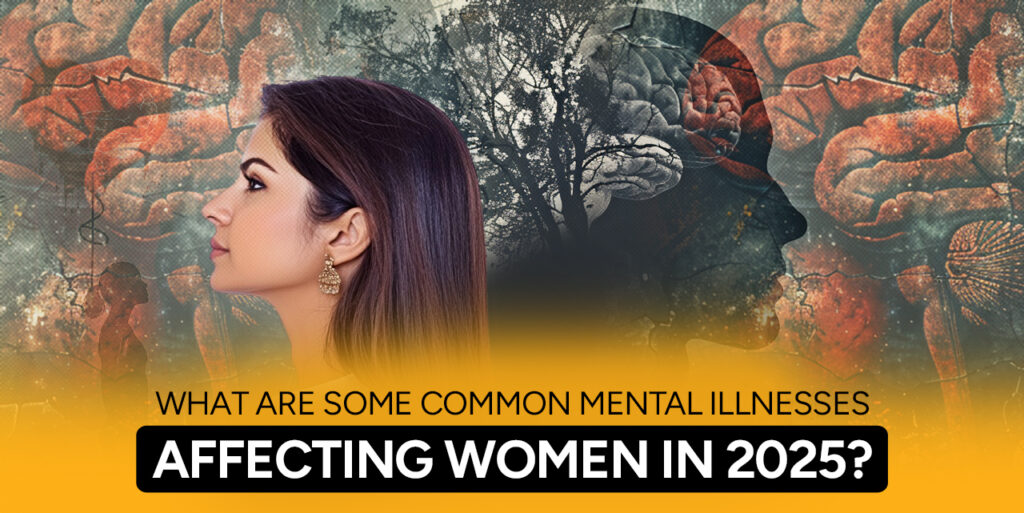The conversation around women’s mental health has grown stronger in recent years, but in 2025, it remains one of the most important topics to address. Women face unique biological, social, and cultural challenges that can put them at a higher risk of certain mental illnesses. Whether it’s balancing careers, family life, or societal expectations, the mental health of women needs continuous attention and care.
When we discuss awareness, campaigns such as Women’s Mental Health Month, World Mental Health Day quotes, and even powerful mental health posters or mental health images shared online play a significant role in encouraging conversations and reducing stigma. But beyond awareness, it’s equally important to understand what women are going through in real life.
Let’s take a closer look at some of the common mental illnesses affecting women in 2025.
Health and Mental Illness in Women

1. Depression
Depression remains the leading mental health condition among women. It’s more than just feeling sad; it can affect daily life, relationships, and overall well-being. Hormonal changes, pregnancy, postpartum experiences, and menopause are factors that can make women more vulnerable.
A popular mental health quote says: “Depression is not a sign of weakness, but a sign you’ve been strong for too long.” Such words remind women that seeking help is a strength, not a flaw.
2. Anxiety Disorders
Anxiety disorders, including panic attacks, phobias, and generalized anxiety, are increasingly common in women. Social pressures, workplace stress, and safety concerns often weigh heavily on women. This makes anxiety not just a personal struggle but a societal issue.
Many World Mental Health Day quotes highlight how anxiety affects people silently. One often shared message is: “Sometimes the people with the biggest smiles are fighting the hardest battles.”
3. Postpartum Depression and Anxiety
Motherhood brings joy, but it can also bring unexpected struggles. Postpartum depression and anxiety are conditions that many new mothers face but often hesitate to talk about. In 2025, we see more awareness campaigns and mental health posters encouraging women to reach out for support during this vulnerable time.
4. Eating Disorders
Eating disorders like anorexia, bulimia, and binge-eating disorder are not just about food; they are often linked to self-image and societal pressures. With the rise of social media and “perfect body” standards still persisting, many women continue to suffer silently. Sharing mental health images and positive body-acceptance campaigns has become an important way to challenge these harmful trends.
5. PTSD (Post-Traumatic Stress Disorder)
Women are statistically more likely to experience Post-Traumatic Stress Disorder (PTSD) due to trauma such as domestic violence, harassment, or abuse. Even in 2025, this remains a serious concern. Therapy, support groups, and legal protections under frameworks like the Mental Health Act are helping women find their way to recovery.
6. Bipolar Disorder
While both men and women can develop bipolar disorder, women often face different patterns, including more frequent depressive episodes. Proper medical treatment and community support play a key role in helping women manage this condition and lead fulfilling lives.
Why Awareness Matters

Raising awareness isn’t just about one day like World Mental Health Day, it’s about constant conversation. That’s why Women Mental Health Month and campaigns filled with powerful World Mental Health Day quotes keep the message alive year-round. Even small things like sharing mental health quotes or mental health images can inspire women to seek help and remind them they are not alone.
Final Thoughts
The mental health of women in 2025 is a topic we cannot afford to ignore. RAVA works on topics that are being ignored or neglected from the forefront of people’s minds, and mental disorders and their side effects are one of them. Depression, anxiety, postpartum struggles, eating disorders, PTSD, and bipolar disorder are among the most common illnesses, but with awareness, compassion, and proper care, women can heal and thrive.
If you or someone you know is struggling, remember: reaching out is the first step toward recovery. To know more about how mental health disorders affect women and how you can help them, watch the documentary “Decode” by RAVA Documentary Films, only on YouTube.

